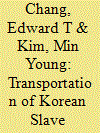| Srl | Item |
| 1 |
ID:
111709


|
|
|
| 2 |
ID:
115660


|
|
|
|
|
| Publication |
2012.
|
| Summary/Abstract |
Most scientists agree that climate change is affected by anthropogenic factors, and measures to reduce carbon dioxide emissions are being considered among countries. The maritime transportation sector must bear its share of responsibility for adopting corrective innovative measures on a global scale. The authors projected the energy consumption and emissions of different marine transportation types in 2050 and applied the model of stabilization wedges to explore activities and technologies to deduce policies that would lead to sustainable marine propulsion. Three percent of the global emissions reductions -about 44 GtCO2/y- required to stabilize the temperature under 2 °C above current levels must come from the maritime sector. To meet a reduction target of this segment, about 1.67 GtCO2/y in 2050, we propose a range of technologies that include mission refinement, resistance reduction, prime mover and propulsion innovation, and new fuels. The authors find that the goal is partially attainable and proposes the balance to be delivered by dedicated land-based synfuel refineries that use carbon dioxide from coal power plants and hydrogen produced from sustainable sources, an approach that would extend the lifecycle of conventional prime movers. We await the adoption of suitable technologies to reduce the emissions in the maritime sector.
|
|
|
|
|
|
|
|
|
|
|
|
|
|
|
|
| 3 |
ID:
078589


|
|
|
|
|
| Publication |
2007.
|
| Summary/Abstract |
Japan was more dependent upon ocean shipping than any other major power during World War II, and the sea route had been the only means of transportation between Korea and Japan. The connecting steamers contributed to Japan's wartime economy by transporting not only raw materials, but also forced laborers and sex slaves between Korea and Japan. More importantly, these connecting steamers were linked to railroads and land routes in Korea and were connected to various systems of transportation, including merchant ships and regular liners outside Japan. In this paper, we examine how Korean laborers and sex slaves were mobilized and transported from Korea to Japan during World War II by focusing on the interdependent relations between railroad-connecting ships and a travel agency
|
|
|
|
|
|
|
|
|
|
|
|
|
|
|
|